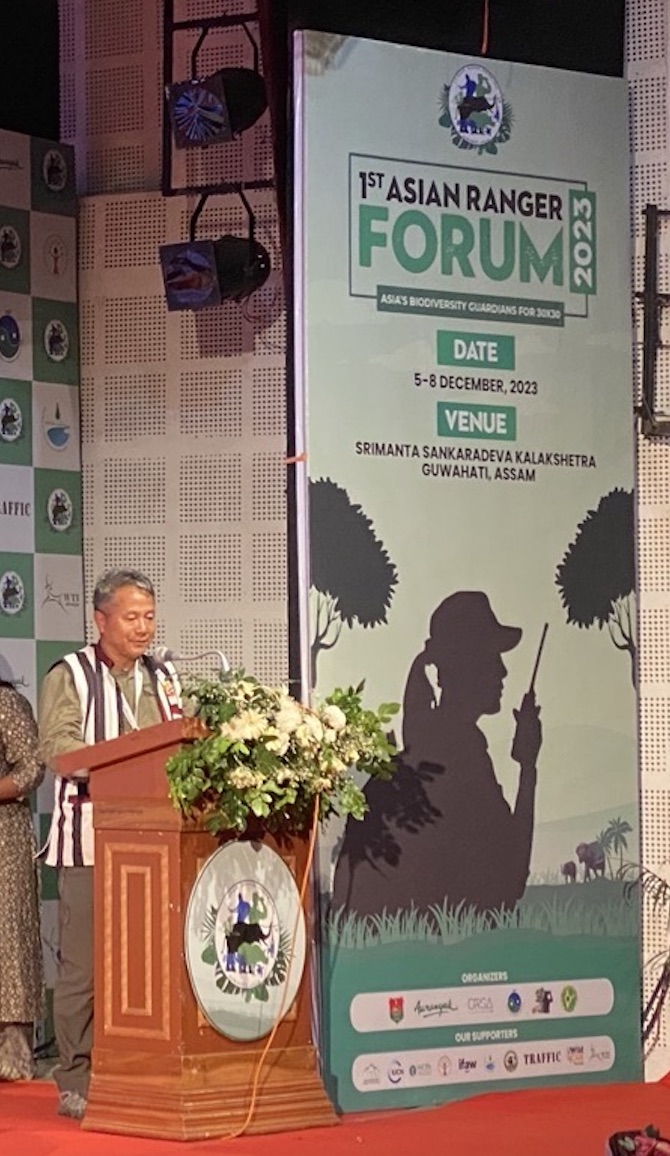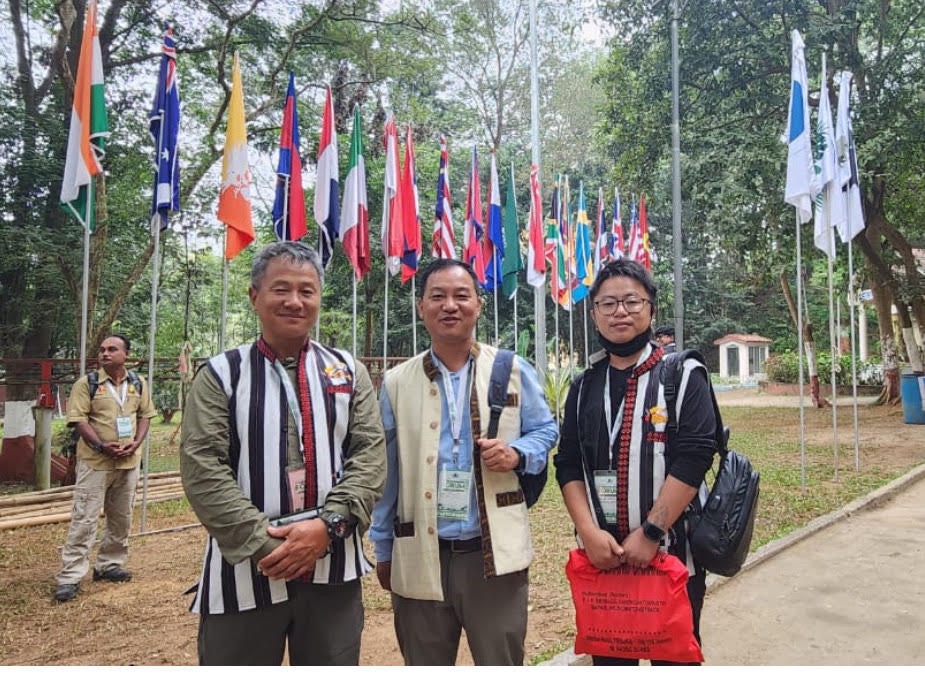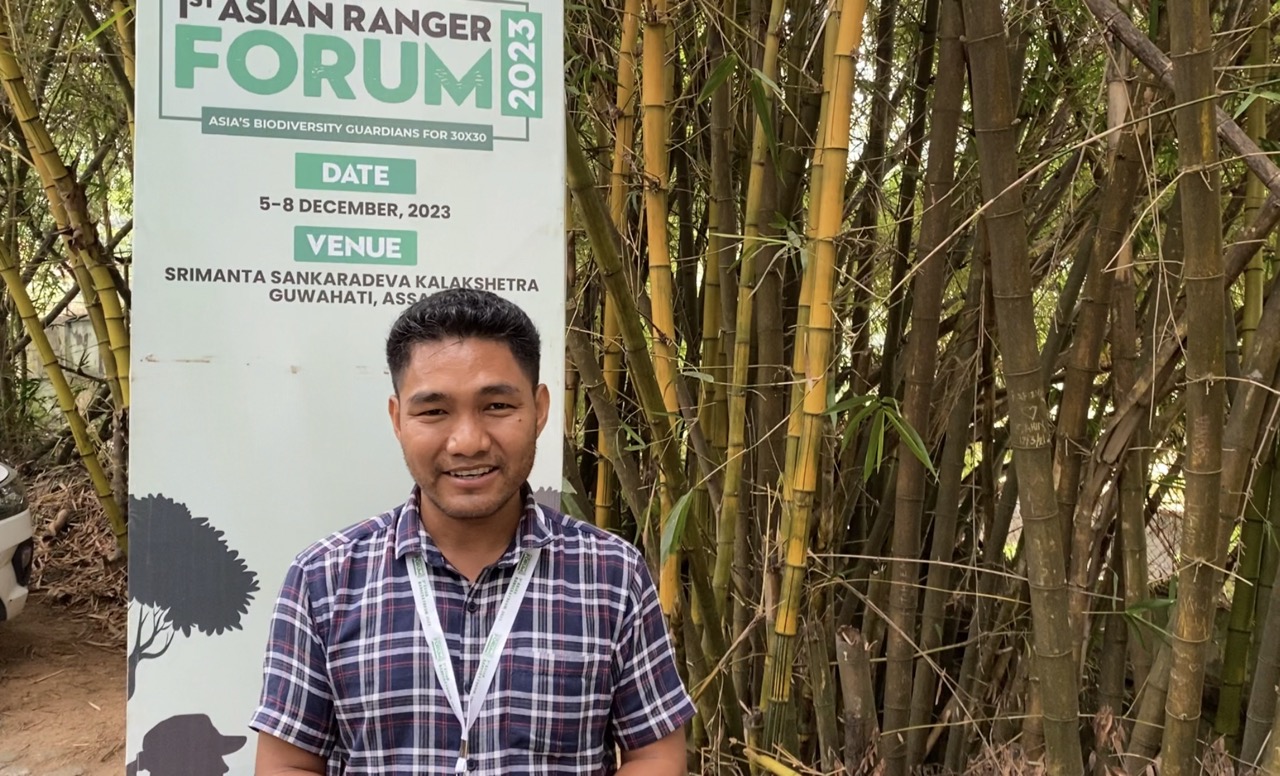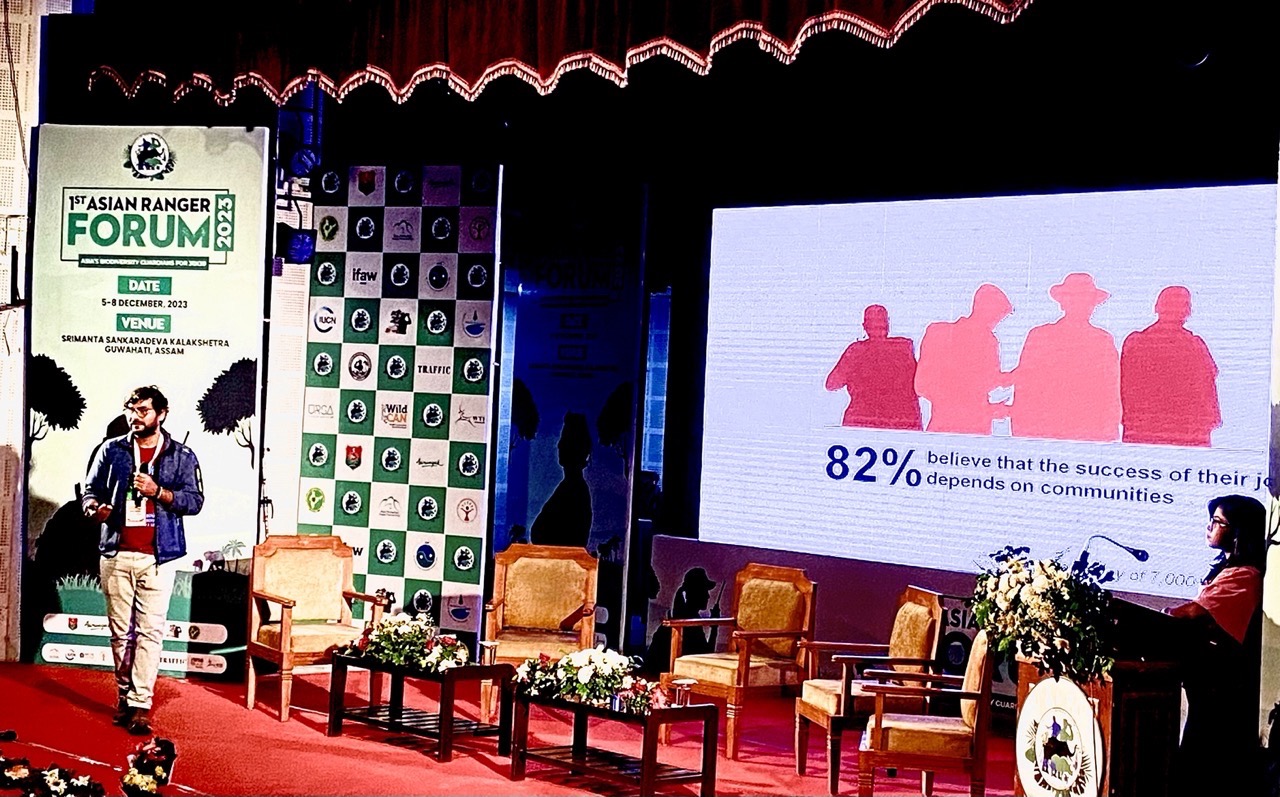Reimagining Conservation: Dispatches from the first Asian Rangers Forum, Assam, India
The first Asian Ranger Forum was a dynamic brainstorming to reimagine conservation: how to centre rangers in global conservation conversations; repositioning rangers as essential planetary health professionals; broadening the definition of rangers as local and Indigenous, men and women; and building trust between rangers and communities. We look forward to building on this momentum with the new Ranger Federation of Asia president Bunty Tao.
Bunty Tao steps onto the stage. Under the spotlights and behind the podium, Bunty knows he has big boots to fill but he is up to the challenge. He has just been democratically elected in as the new President of the Ranger Federation of Asia (part of the International Ranger Federation or IRF). The first Indigenous ranger to hold the position.
Everyone in the audience feels the gravity and joy of the moment.
 Bunty Tao's acceptance speech as the new President of the Asian Ranger Forum
Photo: Hannah Timmins
Bunty Tao's acceptance speech as the new President of the Asian Ranger Forum
Photo: Hannah Timmins
 Bunty Tao (left), stands with Ranger Federation of Asia (a Range Forest Officer; centre) and his son, Johnson (right)
Photo: Hannah Timmins
Bunty Tao (left), stands with Ranger Federation of Asia (a Range Forest Officer; centre) and his son, Johnson (right)
Photo: Hannah Timmins
We are in Guwahati, Assam, India. The week of Asian Ranger Forum workshops, seminars and meetings has been long and exciting. The damp air and rain press down on the leafy campus where we’ve been nourished with rich dhals, Assamese cultural dances and songs, and engaging conversations.
Rohit Singh, the outgoing president, has kept our spirits high and our thoughts focused all week. We have discussed the vital roles that rangers fill as essential planetary health professionals – buffering us from climate collapse, biodiversity loss and zoonotic diseases, protecting our freshwater sources and our pollinators, ensuring that we are fed, watered and safeguarded from extreme weather conditions and soil erosion.
We’ve also heard about the great challenges faced by rangers worldwide: that the average monthly salary of a ranger is less than half that of police, that two rangers die every week on the line of duty and only a third of these have employee insurance to provide their families compensation in case of their death. I watched as the audience’s shoulders slumped when Rohit informed us that only 2% of rangers hope that their children will follow in their footsteps.
As you might expect, the audience seats were filled with rangers in smart khaki uniforms, proudly representing the ranger agencies of Thailand, Malaysia, Indonesia, Korea, India, Nepal, Bhutan… But sat beside these men and women were Indigenous rangers, community rangers wearing traditional clothes, saris, jeans and shirts. A love of nature does not require a uniform and the attendants were all united in their dedication to biodiversity conservation and resolve to build a constituency to achieve their goals.
The topic of ranger-community relations has generated much conversation and debate in the conservation and human-rights world. I’d travelled to Guwahati to learn from rangers how they are building trust with communities. The Indigenous Boro told me about the football tournaments rangers had set up with their villages. Mizing and Bijeet had joined the teams for the love of the game and had consequently learned more about what the rangers did and decided to enrol themselves as rangers. They’ve learnt camera trapping, mapping, patrolling and now they train new recruits in these skills and provide a bridge of understanding between rangers and communities.
 Mizing Boro talks about the importance of football in bringing his Indigenous community and rangers together
Photo: Hannah Timmins
Mizing Boro talks about the importance of football in bringing his Indigenous community and rangers together
Photo: Hannah Timmins
I learned about the importance of women rangers and de-escalation techniques in mitigating conflicts and reducing risks with local people. Bunty and I discussed the importance of learning about the culture and traditions of the community, and identifying their links to nature as a doorway to discussing biodiversity and cultural loss.
 Outgoing president, Rohit Singh, shares data on the 82% of rangers that believe the success of their jobs depends on communities
Photo: Hannah Timmins
Outgoing president, Rohit Singh, shares data on the 82% of rangers that believe the success of their jobs depends on communities
Photo: Hannah Timmins
The audience beamed as Bunty began his acceptance speech. Wearing the traditional black and white striped cloth of his Nyishi tribe, Bunty reminded us once more of the importance of establishing connections between people and nature. He talks to people throughout his region about the once mighty mammoth, a warning that extinction is a real threat and with the loss of important wildlife, like the hornbill or the tiger for his people, comes the loss of culture and tradition.
Bunty strives to ensure the survival not only of wildlife, but also of culture. For Bunty, these traditions include his work as a ranger. In the audience is Bunty’s son, Johnson, also proudly sporting the Nyishi stripes, also a ranger – Bunty is certainly part of the 2%!
There is no doubt that Bunty will make an excellent President. He places people at the heart of conservation, inspiring others to connect the dots between society and nature, and find common goals. Watch this space!
We are collecting these stories and ideas to provide guidance, outreach and training to rangers, local communities and Indigenous peoples globally on how to build more trust with one another. The outputs build on previous scoping reports (available in English and French) and will include the first IUCN WCPA good practice guide aimed at rangers. If you would like to share more ideas, please fill in our survey (available in English | French | Spanish).
Disclaimer
Opinions expressed in posts featured on any Crossroads or other blogs and in related comments are those of the authors and do not necessarily reflect the opinions of IUCN or a consensus of its Member organisations.
IUCN moderates comments and reserves the right to remove posts that are deemed inappropriate, commercial in nature or unrelated to blog posts.



